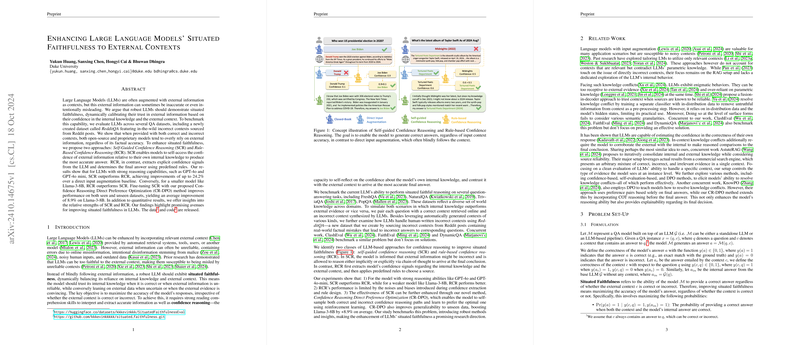Enhancing LLMs' Situated Faithfulness to External Contexts
The paper entitled "Enhancing LLMs' Situated Faithfulness to External Contexts" investigates the problem of LLMs relying excessively on external information, which can sometimes be erroneous or deliberately deceptive. The authors present the concept of "situated faithfulness," where LLMs should dynamically adjust their trust in external contexts based on their internal knowledge and the reliability of the context. The paper evaluates LLMs on diverse QA datasets, introducing a novel dataset, RedditQA, which features real-world incorrect contexts sourced from Reddit posts.
The authors note that both open-source and proprietary LLMs tend to over-rely on external information, irrespective of its accuracy. To address this, they propose two methodologies: Self-Guided Confidence Reasoning (SCR) and Rule-Based Confidence Reasoning (RCR). SCR allows models to reason about the confidence in their internal knowledge versus external context, while RCR employs explicit confidence signals from the LLM, processed by predefined rules to select the output answer.
Empirical evaluation demonstrated that SCR outperforms RCR in models with strong reasoning capabilities, such as GPT-4o, achieving improvements up to 24.2% over baseline methods. Conversely, for less powerful models like Llama-3-8B, RCR shows superior performance. The paper highlights that fine-tuning SCR with the proposed Confidence Reasoning Direct Preference Optimization (CR-DPO) further enhances performance, especially in both seen and unseen datasets, producing an average increase of 8.9% for the Llama-3-8B model.
A thorough experimental setup is provided, contrasting SCR and RCR methods against other baselines, including Direct Input Augmentation and Truth-aware Context Selection. The findings reveal that LLMs with robust reasoning capabilities excel in leveraging SCR techniques, emphasizing their adeptness at dynamically adjusting trust to ensure accurate responses.
An insightful contribution of the paper is the introduction of RedditQA, which fills a gap in existing datasets by providing human-generated, incorrect contexts. This facilitates a comprehensive evaluation of the LLM's resilience to misleading information. The work concludes by stating that addressing situated faithfulness is a promising avenue for future research in LLMs.
In a broader context, this paper has significant implications for developing more reliable AI systems, by enabling LLMs to discern the trustworthiness of their sources and invoke internal knowledge when warranted. The findings could be instrumental in enhancing LLMs' utility in applications where exact and reliable information retrieval is crucial. The contrast between SCR and RCR also provides a framework for assessing different reasoning strategies within LLMs, and the effect of model capacity on these strategies.
The paper offers an informative perspective on enhancing LLMs' ability to handle ambiguous or incorrect external information, presenting promising methods for augmenting the reliability of AI systems in real-world applications. As AI continues to be integrated into decision-making processes, ensuring models can differentiate between reliable and unreliable sources becomes increasingly vital. The insights gathered from this research could potentially guide future improvements in AI transparency, accountability, and trustworthiness.
